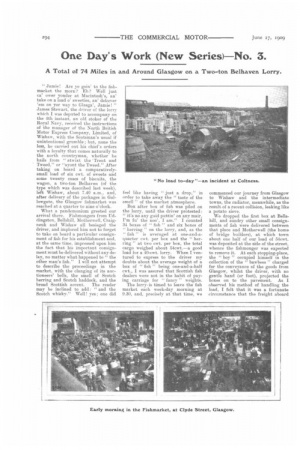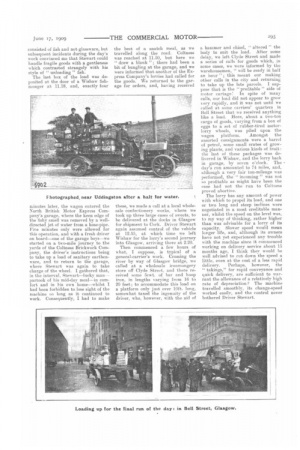One Day' s Work (New Series) No. 3.
Page 6

Page 7

If you've noticed an error in this article please click here to report it so we can fix it.
A Total of 74 Miles in and Around Glasgow on a Two-ton Belhaven Lorry.
" Jamie! Are ye goin' to the fishmarket the morn Eh ? Well just ca.' ower yonder at Macintosh's, an' take on a load o' sweeties, an' deleever 'em on yer way to Glasga', Jamie! " James Stewart, the driver of the lorry which I was deputed to accompany on the 4th instant, an old stoker of the Royal Navy, received the instructions of the manager of the North British Motor Express Company, Limited, of lArishaw, with the Scotsman's usual if unintentional grumble ; but, none the less, he carried out his chief's orders with a loyalty that comes naturally to the north countryman, whether he hails from " atwixt the • Trent and Tweed," or "ayont the Tweed." After taking on board a comparativelysmall load of six cwt. of sweets and some twenty cases of biscuits, the wagon, a two-ton Belhaven (of the type which was described last week), left "Vv`ishaw, about 7.40 a.m., and, after delivery of the packages in Gallowgate, the Glasgow fishrnarket was reached at a quarter to nine o'clock.
What a pandemonium greeted our arrival there. Fishmongers from TMdingston, Bellshill, Motherwell, Craigneuk and VITishaw all besieged the driver, and implored him not to forget to take on board a particular consignment of fish for his establishment and, at the same time, impressed upon him the fact that his important consignment must be delivered without any delay, no matter what happened to "the other man's fish," I will not attempt to describe the proceedings in the market, with the clanging of its auctioneers' bells, the smell of Scotch herring and Scotch haddock, and the broad Scottish accent. The reader may be inclined to add : "and the Scotch whisky." Well yes ; one did
feel like having " just a drop," in order to take away the " taste of the smell " of the market atmosphere. Box after box of fish was piled on the lorry, until the driver protested; "it's no any guid puffin' on any mair, I'm fu' the non', I am." I counted 31 boxes of " fish " and six boxes of
herring " on the lorry, and, as the " fish " is averaged at one-and-aquarter cwt. per box and the " herring " at two cwt. per box, the total cargo weighed about 54cwt.—a good load for a 40-cwt. lorry. When I ventured to express to the driver my doubts about the average weight of a box of " fish " being one-and-a-half cwt., I was assured that Scottish fish dealers were not in the habit of paying carriage for " fancy " weights.
The lorry-is timed to leave the fish market each week-day morning at 9.30, and, precisely at that time, we commenced our journey from Glasgow to Wishaw and the intermediate towns, the radiator, meanwhile, as the result of a recent collision, leaking like a potato sieve.
We dropped the first box at Bellshill, and sundry other small consignments of fish were delivered between that place and Motherwell (the home of bridge builders), at which town about one half of our load of 54cwt was deposited at the side of the street, whence the fishmonger was expected to remove it. At each stopping-place, the " boy" occupied himself in the collection of the " bawbees " charged for the conveyance of the goods from Glasgow, whilst the driver, with no gentle hand (or foot), projected the boxes on to the pavement. As I observed his method of handling the load, I felt that it was a fortunate circumstance that the freight aboard
consisted of fish and not glassware, but subsequent incidents during the day's work convinced me that Stewart could handle fragile goods with a gentleness which contrasted strangely with his style of " unloading " fish. The last box of the load was deposited at the door of a Wishaw fishmonger at 11.18, and, exactly four minutes later, the wagon entered the North British Motor Express Company's garage, where the keen edge of the fishy smell was removed by a welldirected jet of water from a hose-pipe. Five minutes only were allowed for this operation, and with a fresh driver on board—one of the garage boys—we started on a two-mile journey to the yards of the Coltness Brickwork Company, the driver's instructions being to take up a load of sanitary earthenware, and to return to the garage, where Stewart was again to take charge of the wheel. I gathered that, in the interval. Stewart—lucky man---partook of his mid-day meal—in comfort and in his own home—whilst I had been forbidden to lose sight of the machine so long as it continued to work. Consequently, I had to make the best of a snatch meal, as we travelled along the road. Coltness was reached at 11.50, but here we "drew a blank "; there had been a bit of bungling at the garage, and we were informed that another of the Express Company's lorries had called for the goods. We returned to the garage for orders, and, having received these, we made a call at a local wholesale confectionery works, where we took up three large cases of sweets, to be delivered at the docks in Glasgow for shipment to Cork. Driver Stewart again assumed control of the vehicle at 12.55, at which time we left Wishaw for the lorry's second journey into Glasgow, arriving there at 2.20. Then commenced a few hours of what, I suppose, is typical of a general-carrier's work. Crossing the river by way of Glasgow bridge, we called at a wholesale ironmongery store off Clyde Street, and there received some 5cwt. of bar and hoop iron, in lengths varying from 16 to 20 feet ; to accommodate this load on a platform only just over 10ft. long, somewhat taxed the ingenuity of the driver, who, however, with the aid of a hammer and chisel, " altered " the body to suit the load. After some delay, we left Clyde Street and made a series of calls for goods which, in some cases, we were informed by the warehousemen, " will be ready in half an hour " ; this meant our making other calls in the city and returning to take up the late parcels. I suppose that is the "profitable " side of motor cartage! In spite of many calls, our load did not appear to grow very rapidly, and it was not until we called at some carriers' quarters in Bell Street that we received anything like a load. Here, about a two-ton cargo of goods, varying from a box of eggs to a set of rubber-tired motorlorry wheels, was piled upon the wagon platform. Amongst the assorted consignments were a barrel of petrol, some small crates of growing plants, and various kinds of fruit: the last of these packages was delivered in Wishaw, and the lorry back in garage, by seven o'clock. The day's run amounted to 74 miles, and, although a very fair ton-mileage was performed, the " incoming" was not so profitable as might have been the case had not the run to Coltness proved abortive.
The lorry has any amount of power with which to propel its load, and one or two long and steep inclines were negotiated in a most creditable manner, whilst the speed on the level was, to my way of thinking, rather higher than was advisable for a lorry of its capacity. Slower speed would mean longer life, and, although it owners have not yet experienced any trouble with the machine since it commenced working on delivery service about 15 months ago, I think they would be well advised to cut down the speed a little, even at the cost of a less rapid delivery. Perhaps, however, the " takings," for rapid conveyance and quick delivery, are sufficient to warrant the allowance of a relatively high rate of depreciation ? The machine travelled smoothly, its change-speed worked easily, and the control never bothered Driver Stewart.
























